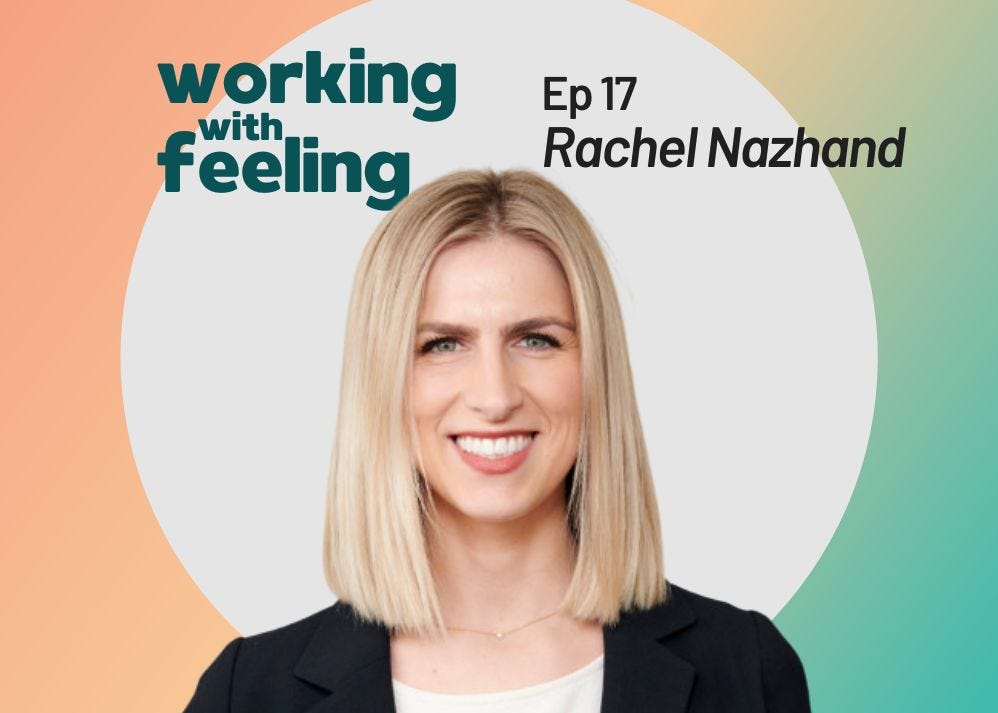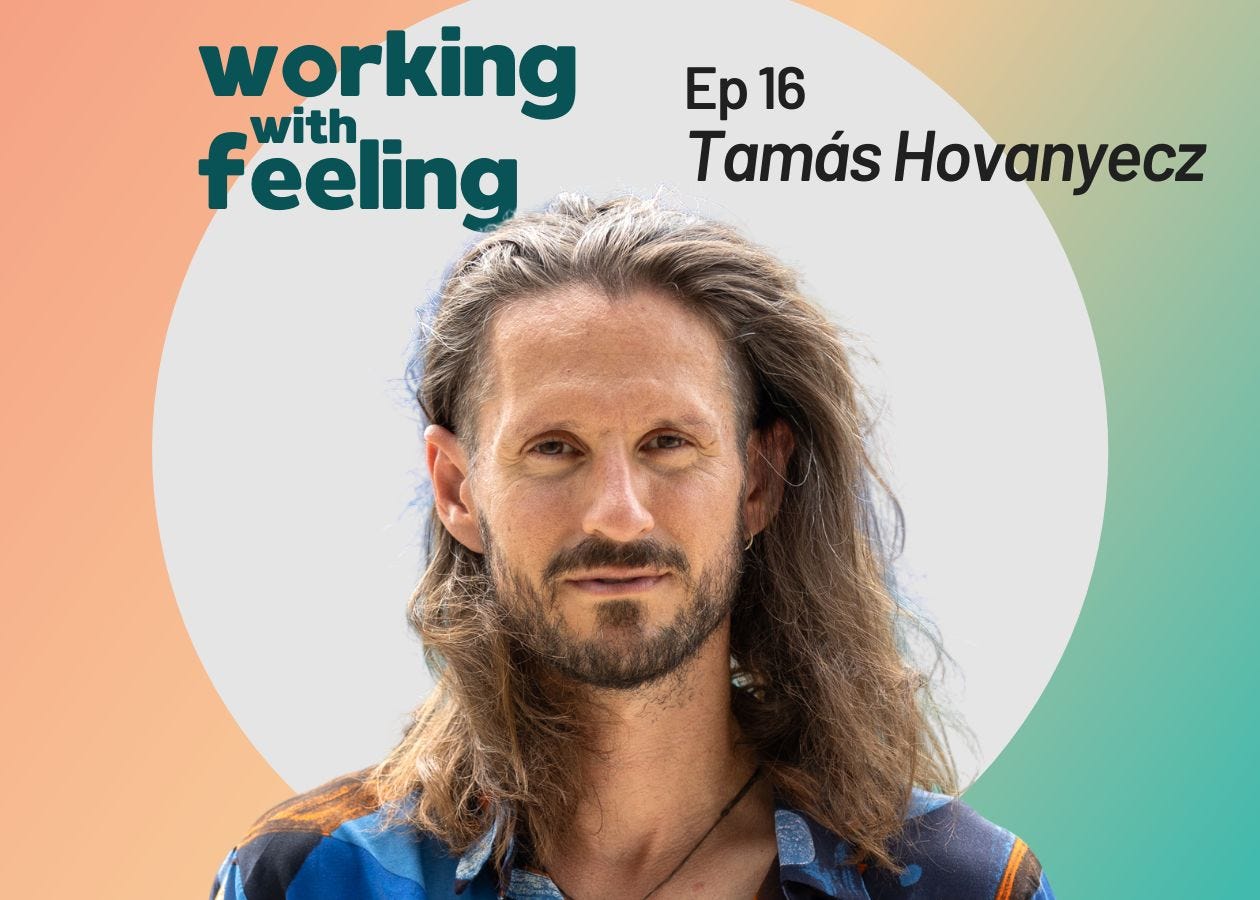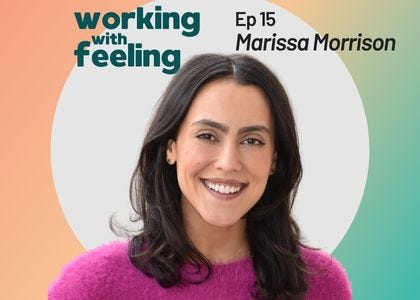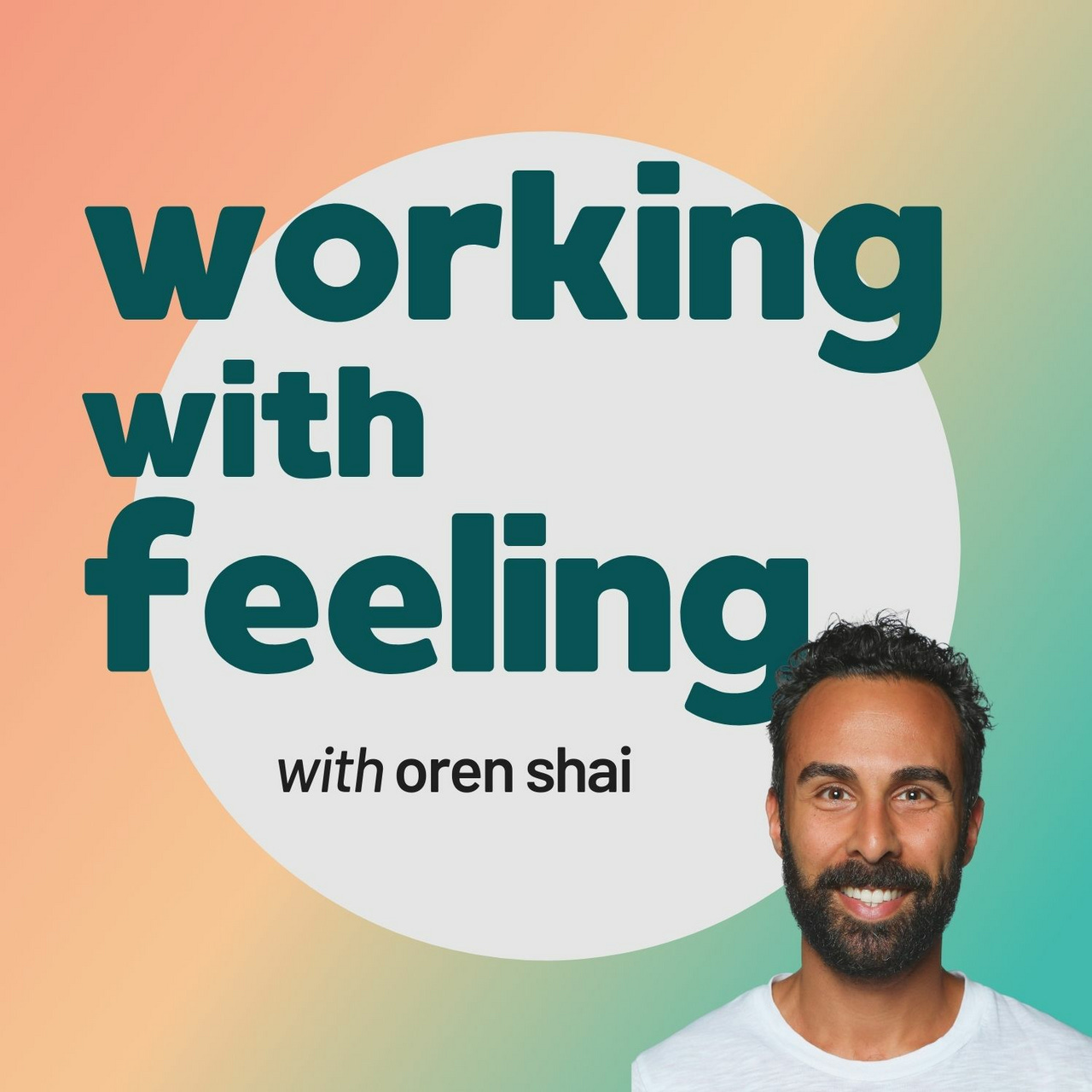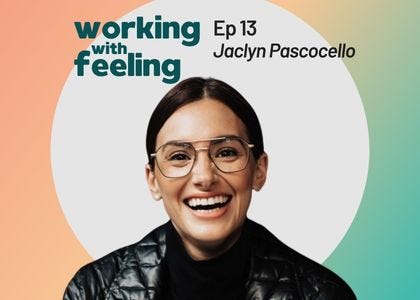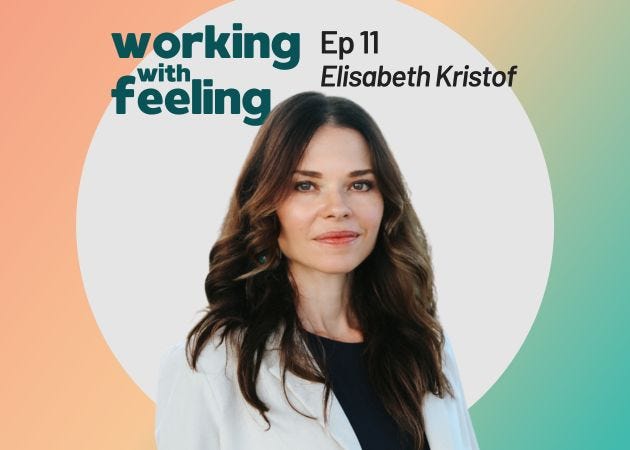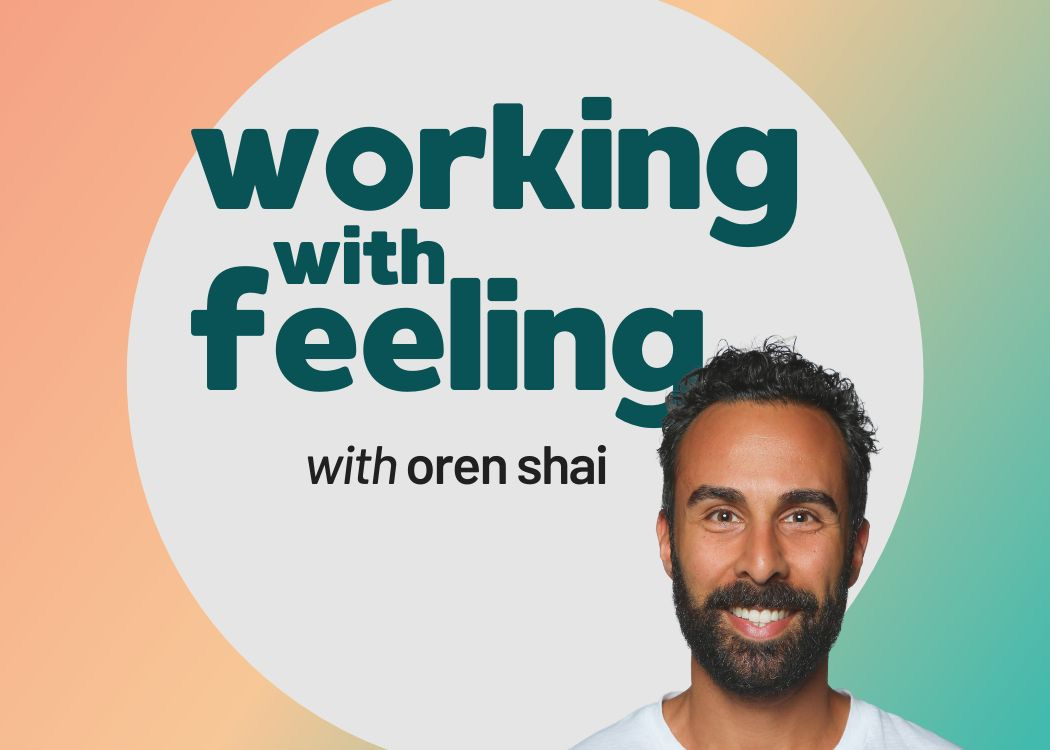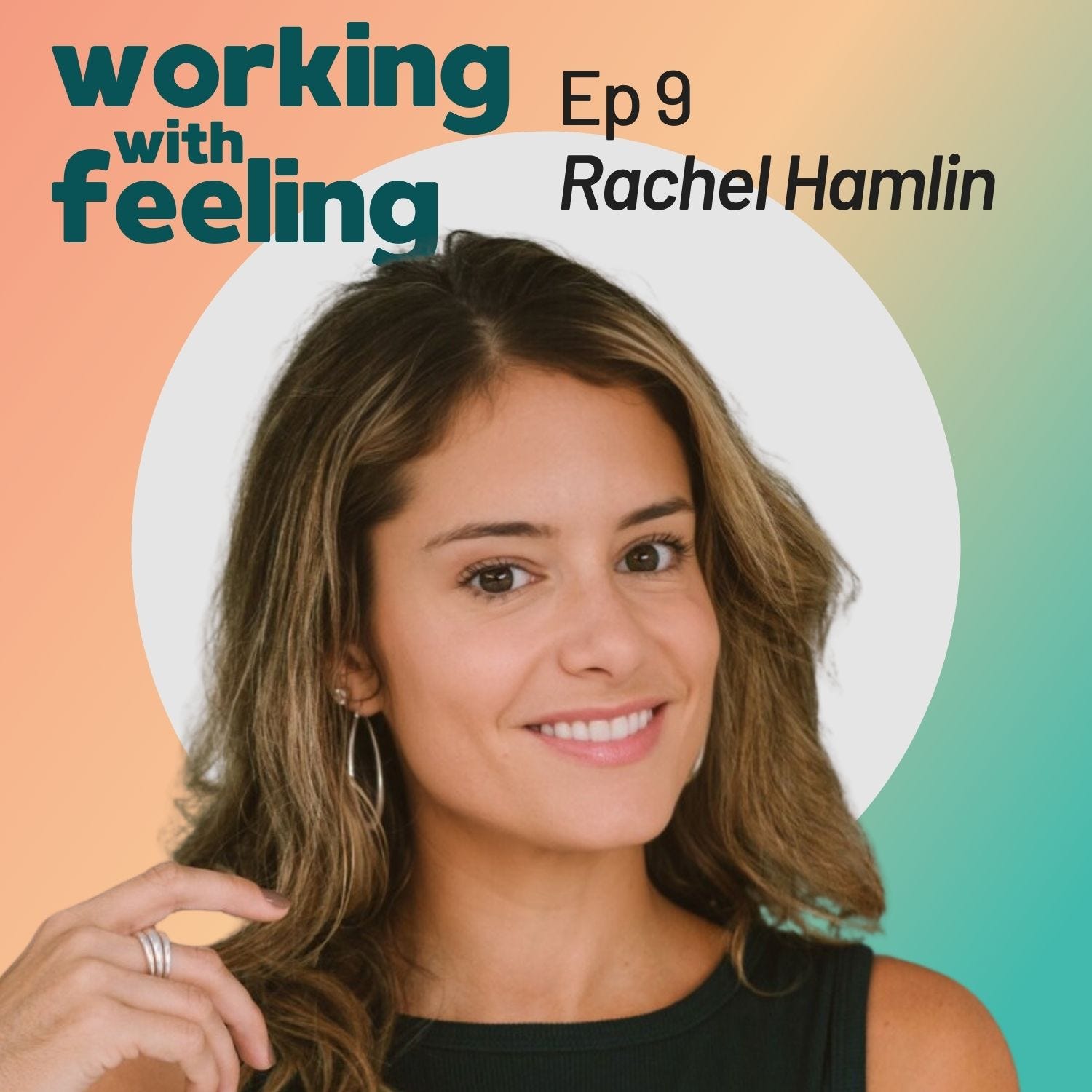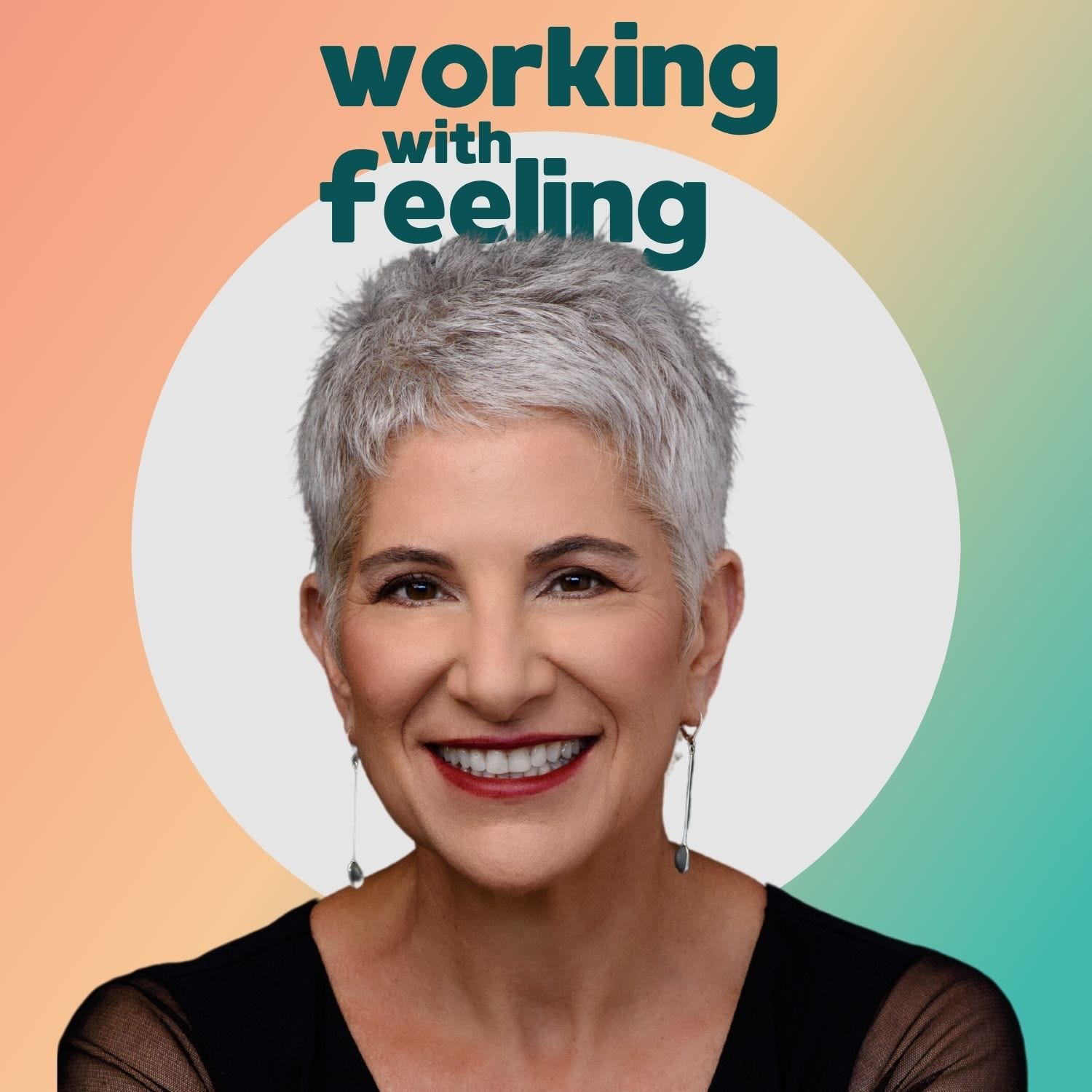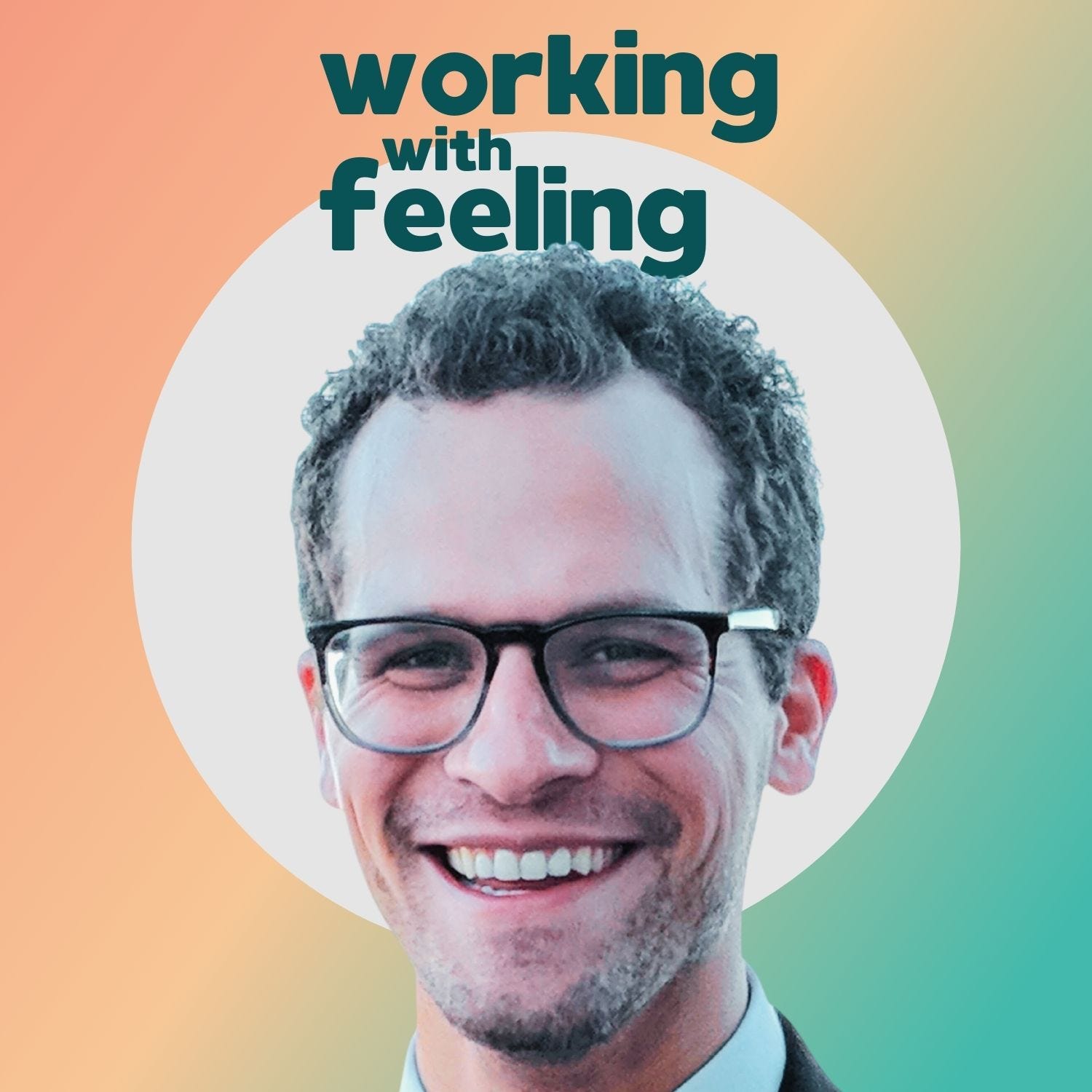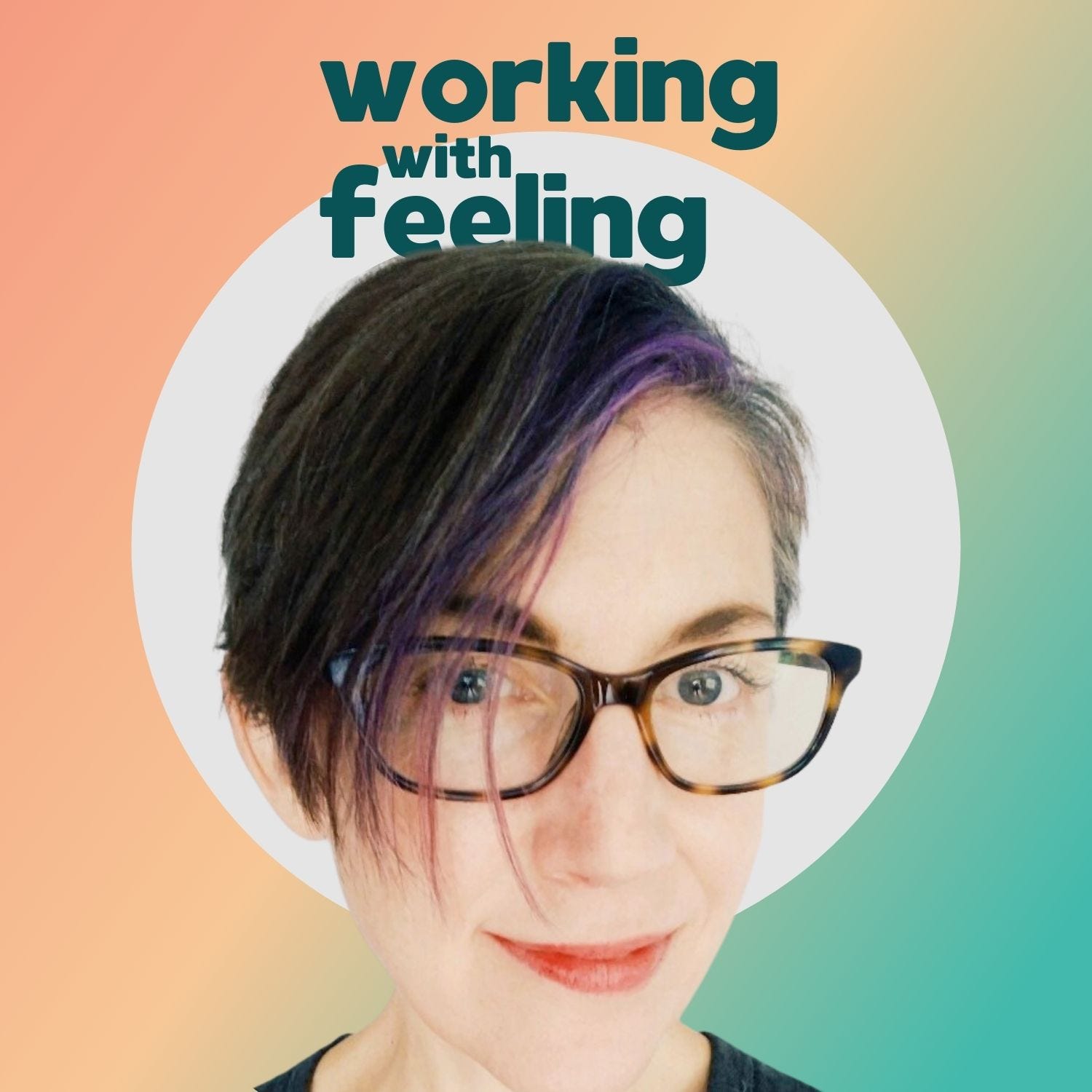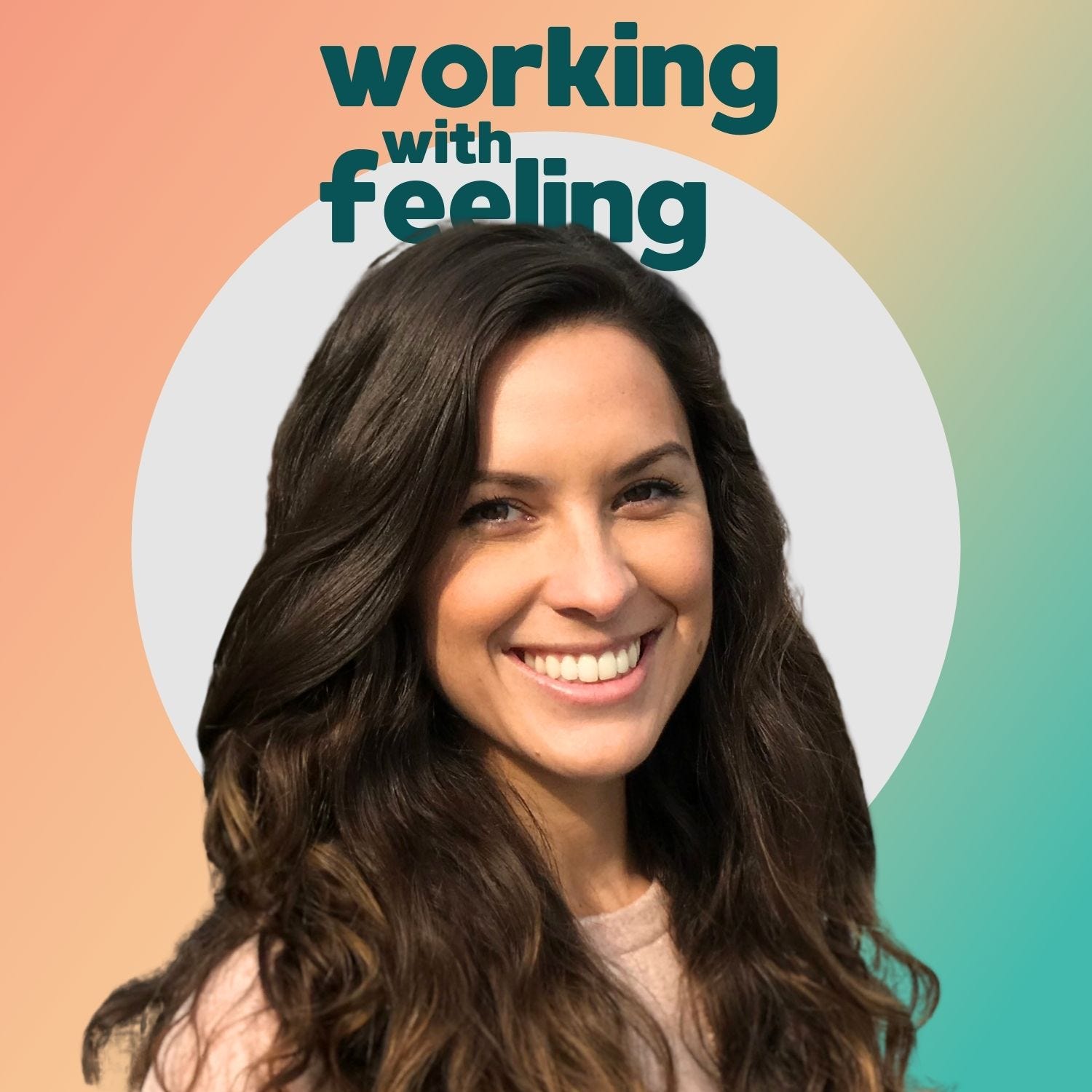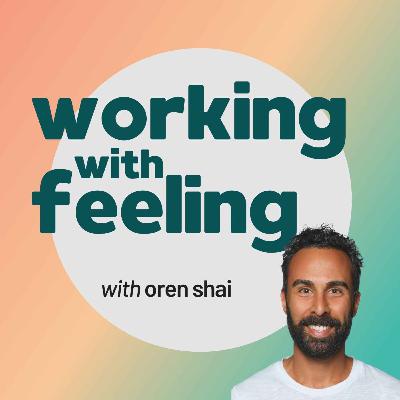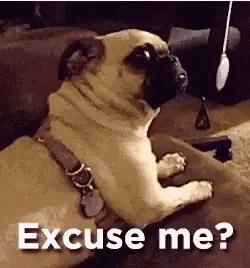Discover Working with Feeling
Working with Feeling

Working with Feeling
Author: with Oren Shai
Subscribed: 0Played: 0Subscribe
Share
© Working with Feeling
Description
Bridging neuroscience and business to show how centering human connection leads to healthier teams and higher impact.
workingwithfeeling.com
workingwithfeeling.com
22 Episodes
Reverse
In this episode, I sit down with Rachel Nazhand, a seasoned ops leader who’s done the high-growth hustle, the burnout, the ER visits… and found her way back to herself. Through a deeply personal conversation, Rachel shares what it’s taken to move from hyper-productivity and depletion into a sustainable rhythm of leadership fueled by presence instead of pressure.Rachel proves that it is possible to lead in high-intensity environments without losing yourself. She’s worked across Fortune 100s, scrappy startups, and pre-IPO orgs, yet what makes her stand out to me goes beyond her resume: she integrates her somatic practice into how she leads, builds teams, and sustains her own well-being.We talk about:* The fallacy of control (and why “just take action” is a trap)* What the nervous system actually needs to reset at work* How she stopped equating worth with output* Tiny, subversive ways to rehumanize fast-paced work cultures* The weirdly transferable wisdom of toddler parentingAnd maybe most importantly, Rachel gives language to what so many high-achieving professionals feel: It might not be the job itself that’s unsustainable. It’s the way we’ve been taught to push through it.“Nobody’s thinking about you as much as you’re thinking about you—so you might as well use that to your advantage.”🎧 Listen for real talk about success that doesn’t require self-sacrifice.Follow Rachel on LinkedInFollow Oren on LinkedInLearn more about somatic work for leaders at Feeling School.Learning something from the podcast? Leave a review, hit subscribe, and share this episode with one person who keep trying to optimize their way out of overwhelm. (We all know one.) This is a public episode. If you would like to discuss this with other subscribers or get access to bonus episodes, visit workingwithfeeling.com
What if resilience wasn’t something you build alone, but something we practice together? If you’ve ever noticed the way some well-intentioned leadership skills fall flat in high-stakes moments, this conversation is for you.In this conversation, I sit down with Tamás Hovanyecz — a leadership guide, facilitator, and highliner (yep, he willingly walks across ropes suspended hundreds of meters in the air) — to talk about how our nervous systems and relational patterns shape our capacity to lead, respond, and connect when it matters most.We explore:* Why most leadership development quietly collapses the moment pressure hits* What “relational intelligence” looks like in a room full of Type-A world-changers* The cost of staying in protection mode — for you, your team, and your nervous system* How systems mirror survival states (yes, your org chart might be dissociating)* What actually helps teams innovate during crisis (spoiler: it’s not grit)* How a slackline can expose your fear and your healing in 10 seconds flatTamás also shares a story about what happens when you ask ambitious humans to slow down and just relate. (Spoiler: some tried to form a rebellion. Others had a breakthrough.)💬 “Shifting how we interact and relate with each other is inherently changing the system.” — Tamás HovanyeczThe real shift doesn’t happen in your head. It happens in the space between us. As always, this show is about coming back into relationship — with your body, your people, your work. Not in theory. In practice.Mentioned in the episode:* Inner Mastery Lab: innermasterylab.co* WHO Cards: whocards.cc* Find Tamas on LinkedInFind Oren on LinkedIn for the neuroscience of impact from the inside outAccess the Working with Feeling newsletter and show notesEnjoy this episode? Leave a review, subscribe, and share the episode with one person you kinda like and want to have groundedness amidst the chaos of life. This is a public episode. If you would like to discuss this with other subscribers or get access to bonus episodes, visit workingwithfeeling.com
A relentless pace is the norm for most of us at work. For many leaders, especially those leading in distributed and fast-paced environments, the default has become more: more meetings, more obligations, more to prove.In this rich conversation with Marissa Morrison, we explore what becomes possible when we disrupt that default. When we pause.Marissa shares her journey from burnout to clarity, and the small-but-mighty practices she’s brought to herself and her teams—monthly prioritization check-ins, walk-and-talks, meeting resets, and making the phone call cool again. These are more than hacks. They are culture-shaping moves that remind us: we have agency.And beneath it all, this question: Am I present in my own life?Whether you’re a seasoned leader or early in your exploration of inner work, this episode offers both permission and practical ways to return to what matters.We touch on:• The cost of inherited urgency and what it takes to interrupt it• Why simplification is a leadership superpower• How to design your weeks around your natural energy rhythms• Moving from “shoulds” to “what fills my cup”• Life audits, seasonal practices, and evolving how we care for ourselvesClarity isn’t just a strategy tool — it happens through your nervous system.🔗 Connect with Marissa Morrison on LinkedIn🌀 Practice mentioned: The Artist’s Way by Julia Cameron📝 Invitation: Try morning pages or a solo, tech-free walk this week. * Find Oren on LinkedIn for the neuroscience of impact from the inside out* Access the Working with Feeling newsletter and show notesEnjoy this episode? Leave a review, subscribe, and share the episode with one person you kinda like and want to have groundedness amidst the chaos of life. This is a public episode. If you would like to discuss this with other subscribers or get access to bonus episodes, visit workingwithfeeling.com
If you’ve ever found yourself overthinking while your friends just blurt things out with reckless ease, or if you’ve perfected the art of appearing engaged while internally planning an escape route — welcome. You’re human. And today we’ll uncover why the advice to ‘just be vulnerable’ is just plain silly.We’ll also get into the sneaky push/pull between cultural expectations and our biology, breaking down why high performers struggle with connection, and sharing two super simple practices to make social interactions feel less high-stakes.What we cover• The cultural myths that keep us stuck in isolation, despite our innate need for connection.• How our neurobiology reacts to vulnerability, and why ignoring it makes connection harder.• The SAD Cycle (Stress, Anxiety, and Depletion) and how it perpetuates disconnection.• Moving from an orientation of control to an orientation of connection.Key takeaways✅ Connection is a biological necessity, not a luxury. Our nervous system depends on it.✅ Hyper-individualism is a cultural lie. We cannot truly thrive alone.✅ Vulnerability isn’t just emotional — it’s physiological. Understanding this helps us keep opening instead of avoiding.✅ Somatic awareness is key. Noticing subtle shifts in the body allows us to catch protective patterns before they block connection.✅ Small changes make a big difference. Two simple practices—deepening eye contact and resetting between interactions—can transform how we connect.Action steps🔹 Note attention quality. Notice not just what someone is saying, but the emotional resonance behind their words. Where is your attention when you’re looking at someone?🔹 Reset before interactions. Before meetings or social situations, take a few seconds to let go of whatever emotional charge you’re carrying, so you can arrive more fully present.Join the conversation💬 What resonated most with you? What practice are you trying this week? DM Oren on LinkedIn or Substack.📩 Need support in cultivating deeper connection and somatic awareness? Reach out to Oren for coaching, referrals, and practical resources.Support this work!✔ Subscribe to Working with Feeling for more insights on human connection, nervous system fluency, and leading with presence.✔ Leave a review to help spread these conversations and shift our culture toward one of deeper connection. This is a public episode. If you would like to discuss this with other subscribers or get access to bonus episodes, visit workingwithfeeling.com
How can we bring about more connection and belonging in personal and professional settings by addressing the root issue that lies beyond those walls? Join me as I sit down with Jaclyn Pascocello, founder of Fabrik, a third space designed to combat loneliness and foster deeper human connection. We explore the systemic roots of disconnection, the neuroscience behind why casual interactions matter, and practical steps for reclaiming real-life community in an increasingly digital world.What We Cover in This Episode✅ The loneliness epidemic and its impact on mental & physical health✅ The importance of second- and third-degree connections in our daily lives✅ Why third spaces (beyond home and work) are essential for well-being✅ The problem with corporate mental health initiatives that don’t address real human needs✅ How organizations can rethink engagement & belonging in a way that actually works✅ Small steps to cultivate more connection in your daily life✅ Why re-learning social presence & interaction is key in a world of digital distraction✅ Jaclyn’s personal somatic practices for grounding and presenceAbout Jaclyn PascocelloJaclyn is the founder of Fabrik, a unique third space in NYC designed to combat loneliness and foster meaningful connection. With a background in hospitality and startups, she has dedicated her career to creating spaces that bring people together in a disconnected world.Links* Connect with Jaclyn on LinkedIn* Check out Fabrik’s website* Find Oren on LinkedIn* Working with Feeling newsletter and show notes—Enjoy this episode? *Please leave a review*, subscribe, and share the episode with one person you kinda like and want to have a happy nervous system! This is a public episode. If you would like to discuss this with other subscribers or get access to bonus episodes, visit workingwithfeeling.com
Something often missing in the conversation about nervous system regulation and emotional intelligence is the essential role of the ongoing practice of presence. It’s more tangible than it sounds, I promise.So, what is the 'Big P' practice that transcends traditional compartmentalized approaches to personal growth? How does it look to continuously engage with our inner state to connect more fully with the people and activities we care about? Being present in every moment is a worthy aspiration in a disconnected world where our attention is actively fragmented. Whatever your goals may be, coming back to a more whole presence facilitates them. And it starts now, in the body. Key Moments05:35 Understanding Big P Practice09:59 Nervous System Regulation and Presence12:55 The Continuous Journey of PracticeLinks* Ido Portal on Youtube* Oren on LinkedIn* Working with Feeling newsletter with detailed show notes and resourcesEnjoy this episode? *Please leave a review*, subscribe, and share the episode with one person you kinda like and want to have a happy nervous system.Intro/outro music by Youssouf Karembe (licensed). Listen to the full track here. This is a public episode. If you would like to discuss this with other subscribers or get access to bonus episodes, visit workingwithfeeling.com
This might be the most comprehensive approach to nervous system regulation and somatics you’ve heard. Listen in to this conversation so you can find the signal through all that noise out there as somatics and nervous system work continues going mainstream. Elisabeth Kristof’s work is unique and powerful, and stands out from the growing hype around somatics in several key ways we discuss.One of those ways: by addressing the power of going beyond our nervous system *outputs* and tending to sensory *inputs* essential for neuroplasticity for personal growth. This is how we get to the root of increasing our capacity for change from the inside out.We also address the very real challenges of modern life that often go unnamed, the dangers of those tempting cathartic experiences that center intense emotional release, and practical tools for healthy emotional expression and regulation. (Spoiler alert: you probably can’t “heal” your nervous system on one retreat in a Tulum jungle or Costa Rican beach.)What does a more holistic approach to nervous system health look like? And how do we move toward a personal growth paradigm for true, sustainable change which considers the unique history and physiology of the individual?Explore these questions with us so you can continue developing your personal practice and experiencing the aliveness you’ve known is possible.About ElisabethElisabeth Kristof, MA, is an Applied Neurology & Somatic Practitioner, and co-host of the Apple Top 100 podcast, Trauma Rewired.Elisabeth has been involved in neuro- and movement-based therapies since 2007, with a focus on the intersection of complex trauma and nervous system regulation for the past five years. Her expertise has positioned her as a leading voice in the field of trauma-informed neurology.Elisabeth is the founder of the Neurosomatic Intelligence (NSI) coaching certification program, an ICF-accredited course that trains practitioners, therapists, and coaches to harness the power of the nervous system for resilience, behavior change, and performance.She is also the founder of BrainBased.com an online community that uses applied neurology and somatics for nervous system health, emotional expression and resilience.Key Moments00:00 Understanding the Nervous System and Emotional Processing05:55 The Importance of Sensory Inputs in Behavior Change11:55 Rehabilitation of the Nervous System in Modern Life18:05 The Role of Neuroplasticity in Personal Growth24:12 Navigating Emotional Experiences and Regulation30:11 The Dangers of Cathartic Experiences35:52 Practical Tools for Emotional Expression and RegulationTakeaways* Minimum effective dosing is crucial for emotional processing.* The nervous system's health is linked to physical movement.* Inputs from our body significantly influence our behavior.* Cognitive thoughts alone cannot create sustainable change.* Emotions are physiological experiences, not just thoughts.* Understanding our sensory input systems is essential for change.* Nervous system rehabilitation is necessary in modern life.* Neuroplasticity allows for both positive and negative adaptations.* Emotional expression is vital for physical and mental health.* Daily practices can significantly improve nervous system function.Links* Elisabeth on Instagram* Neurosomatic Intelligence* BrainBased* Trauma Rewired Podcast* Oren on LinkedIn* Working with Feeling newsletter and show notes—Enjoy this episode? *Please leave a review*, subscribe, and share the episode with one person you kinda like and want to have a happy nervous system!Intro/outro music by Youssouf Karembe (licensed). Listen to the full track here. This is a public episode. If you would like to discuss this with other subscribers or get access to bonus episodes, visit workingwithfeeling.com
Why is it often hard to truly relax? And what’s happening beneath the surface when we feel “wired but tired”?Following our last chat with Rachel Hamlin, we break down why downregulation can be so tricky in modern life, and cover practical somatic tools to have in your back pocket. If you’ve ever found yourself on the thought carousel at night and struggling to step off, this one’s for you.Key Ideas[01:00] Why It’s So Hard to Switch OffOren explains why our ancient survival wiring clashes with our modern environment, making relaxation something we have to re-learn.[02:30] The Science of DownregulationDiscover what downregulation is, why “just relaxing” doesn’t work, and how the autonomic nervous system responds to constant, low-grade stressors.[04:30] The Window of Tolerance: Finding Your CenterAn intro to Dan Siegel’s Window of Tolerance, a framework that helps you get a sense of your arousal level so you can determine what you need.[06:30] Practical Tools for UnwindingAccessible techniques to based on the “Clearing” and “Caring” pathways.[09:30] Clearing vs. Caring: Choosing the Right PracticeTwo distinct approaches to managing arousal — one to release excess energy, the other to gently soothe.Somatic practices are not one-size-fits-all. Learn how to personalize these practices, tune into your body’s unique signals, and adjust based on what feels right for you.—View the full show notes with any accompanying visuals.Connect with Oren on LinkedIn—Enjoy this episode? *Please leave a review*, subscribe, and share the episode with one person who could benefit from shifting from control to connection in life and leadership.Intro/outro music by Youssouf Karembe (licensed). Listen to the full track here. This is a public episode. If you would like to discuss this with other subscribers or get access to bonus episodes, visit workingwithfeeling.com
It’s a new season of Working with Feeling and we’re kicking it off with an inspiring conversation with Rachel Hamlin, a product leader turned executive coach and somatic healer. Rachel shares her journey of helping founders and executives overcome burnout and create balance using a neuroscience-backed approach that blends somatic healing with practical strategies for managing stress.I think you’ll hear how much I loved nerding out with Rachel around the profound impact that reconnecting with the body has on leadership, the art and science of somatic work, and what it really means to feel emotions fully rather than intellectualizing them. This is a must-listen for leaders and teams who want to navigate uncertainty with greater ease and resilience.Listen in to learn about:• Somatic healing and why it’s more than just a mindset shift.• How being present in the body helps in setting healthier boundaries and breaking free from the cycle of chronic stress.• The link between emotional regulation and effective leadership.• Why somatic awareness is crucial for creating lasting change in work culture and beyond.• Practical tips for starting a somatic practice, even amidst a busy schedule.Whether you’re an executive seeking better stress management strategies or simply curious about somatic work, this episode offers valuable insights on how embracing the body-mind connection can lead to greater personal and professional well-being.Links* Rachel on LinkedIn / Rachel’s Website* Oren on LinkedIn* The Tapping Solution app* Brad Yates tapping on YouTube* Carol Dweck research* Thom Knowles: What is Evolution?—Enjoy this episode? *Please leave a review*, subscribe, and share the episode with one person who could benefit from Rachel’s wisdom on embodying calm, connection, and leadership.Intro/outro music by Youssouf Karembe (licensed). Listen to the full track here. This is a public episode. If you would like to discuss this with other subscribers or get access to bonus episodes, visit workingwithfeeling.com
We're living in a rock concert -- an overstimulating world set up to keep the music blaring. So it's no wonder we numb ourselves to sensory input. It's necessary in order to get by.But there are some very accessible practices to help us give our nervous system a break from the noise and an opportunity to recalibrate to our humanity. Today, we explore some of the new science that offers a renewed lens on the thing we've been doing for as long as we've been up on two feet: walking.We'll cover three ways to approach walking with more awareness:IntervalsVisualizationSensory engagementI hope you'll give these a try. If we want to show up in a more human way in the world -- to bring more creativity and instigate more positive change -- we gotta be less stressed to do it!--To support this podcast and contribute to making work more human, please subscribe and share the pod with a friend.I hope you'll also share your experiences, ask questions, and offer suggestions for future episodes.Connect with Oren on LinkedInAccess resources on Whole-Human leadershipIntro/outro music by Youssouf Karembe (licensed). Listen to the full track here. Hosted on Acast. See acast.com/privacy for more information. This is a public episode. If you would like to discuss this with other subscribers or get access to bonus episodes, visit workingwithfeeling.com
Have you ever wondered why truly inclusive work environments are so hard to come by? I mean, how many teams have you been a part of that you'd describe as inclusive? *chirp chirp*Today's conversation delves into the heart of leadership itself, exploring how self-awareness and inclusivity can drive change and innovation in any field. Despite the growing attention to diversity, equity, and inclusion, work culture is still stuck in incremental change mode. This is a call to action for leaders at all levels to challenge that, starting within themselves.(0:11:17) - What is boldly inclusive leadership?(0:21:15) - The role of embracing the unknown(0:26:32) - Being a leader is being real(0:40:12) - The essential step of taking care of your inner stateToday's GuestMinette Norman is an author, speaker, and leadership consultant who previously spent decades leading global technical teams in the software industry. Minette has extensive experience leading internationally distributed teams and believes that when groups embrace diversity in all its forms, breakthroughs emerge, and innovation accelerates.Minette is a keynote speaker on topics of inclusive leadership, psychological safety, collaborative teams, and empathy and the co-author of The Psychological Safety Playbook: Lead More Powerfully by Being More Human. Her second book, The Boldly Inclusive Leader was released this month.Connect with Minette: https://www.minettenorman.com/Read Minette's excellent new book, The Boldly Inclusive Leader: boldlyinclusiveleader.com--If you want to contribute to making work more human, please subscribe and share the pod with a friend.Connect with Oren on LinkedInAccess resources on Whole-Human leadershipIntro/outro music by Youssouf Karembe (licensed). Listen to the full track here.--Episode keywords: Inclusive Leadership, Self-Awareness, Diversity, Equity, Inclusion, Neuroscience, People Management, Adaptation, Resilience, Change and Innovation, Representation of Women, Marginalized Groups, Tech Leadership, Creativity, Leadership Style Hosted on Acast. See acast.com/privacy for more information. This is a public episode. If you would like to discuss this with other subscribers or get access to bonus episodes, visit workingwithfeeling.com
Imagine facing challenges with a knowing that you've got what it takes – that's self-efficacy.In this Somatic Side we delve into how rituals help you tap into your self-efficacy so you can move toward your goals with relaxed presence instead of autopilot-driven pressure.Whether it's a pause and prayer as you hold your morning coffee or a moment of gratitude for your body before your workout, find you intentional moment to help you ground into your capacity.-Please get in touch to share your experiences, ask questions, and offer suggestions for future episodes!Connect with Oren on LinkedInAccess resources on Whole-Human leadershipIf you want to contribute to making work more human, please subscribe and share the pod with a friend.Intro/outro music by Youssouf Karembe (licensed). Listen to the full track here. Hosted on Acast. See acast.com/privacy for more information. This is a public episode. If you would like to discuss this with other subscribers or get access to bonus episodes, visit workingwithfeeling.com
Have you ever wondered what it would be like if more of us knew how to intentionally connect with what's truly most important to us? On this episode we'll learn about the power of ritual for embodying our values individually, organizationally, and collectively.Our guest today is Ezra Bookman, a nationally recognized ritual designer, artist, and facilitator, with work featured in the NYTimes, The Atlantic, VICE, and ABC News. Ezra is founder of Ritualist, a creative studio helping leaders cultivate more conscious companies and connected communities.“The right rituals in the right places will help you build your culture, cohere your team, and achieve your goals. Building your own rituals is as important as building your product.” ⏤ Reid Hoffman, Co-founder LinkedInTimestamps00:03:29 Designing intentional, symbolic rituals. 00:06:28 How rituals help us break out of autopilot.00:15:02 The value of rituals in organizations. 00:31:40 Rituals that help embody and reinforce values. 00:35:49 Rituals that reflect values and identity. 00:47:04 The power of ritualizing life.Connect with EzraRitualistLinkedIn--If you want to contribute to making work more human, please subscribe and share the pod with a friend.Connect with Oren on LinkedInAccess resources on Whole-Human leadershipIntro/outro music by Youssouf Karembe (licensed). Listen to the full track here. Hosted on Acast. See acast.com/privacy for more information. This is a public episode. If you would like to discuss this with other subscribers or get access to bonus episodes, visit workingwithfeeling.com
In this Somatic Side of Whole-Human Work, we explore the profound impact of somatic awareness on our social connections.By tuning into the sensations within our bodies during interactions, we can create deeper, more meaningful relationships.In this episode we'll cover two helpful practices: inserting space into conversations to notice sensation, and yoga nidra (NSDR / non-sleep deep rest) to help us get better at creating that space.Please get in touch to share your experiences, ask questions, and offer suggestions for future episodes!--If you want to contribute to making work more human, please subscribe and share the pod with a friend.Connect with Oren on LinkedInAccess resources on Whole-Human leadershipIntro/outro music by Youssouf Karembe (licensed). Listen to the full track here. Hosted on Acast. See acast.com/privacy for more information. This is a public episode. If you would like to discuss this with other subscribers or get access to bonus episodes, visit workingwithfeeling.com
Have you ever wondered why belonging is so elusive in the modern workplace?In this episode, entrepreneur, researcher, and strategist Laure Cast shares about the role of community in work and life, and the paradigm shift needed to create spaces which facilitate true belonging. This conversation will challenge your view of community and inspire you to experiment with creating real connection at work.Timestamps[00:01:14] Community 101[00:04:07] Individualism vs community[00:09:41] Is community building at odds with business goals?[00:16:22] Community-oriented business models[00:25:49] The responsibility of getting uncomfortable[00:42:58] Possible future directions for communityFind Laure on LinkedInVisit fractals.community--If you want to contribute to making work more human, please subscribe and share the pod with a friend.Connect with Oren on LinkedInAccess resources on Whole-Human leadershipIntro/outro music by Youssouf Karembe (licensed). Listen to the full track here.Keywords: community, emergence, organizational structures, self-awareness, complexity Hosted on Acast. See acast.com/privacy for more information. This is a public episode. If you would like to discuss this with other subscribers or get access to bonus episodes, visit workingwithfeeling.com
For this Somatic Side inspired by our last guest conversation, we cover an embodied perspective on meditation.Contrary to popular belief, relaxation isn't only an outcome of meditation. It's actually something we need to practice in order to cultivate a consistent meditation practice.But in a work culture that values being busy and stressed few of us know how to truly relax. To experience the benefits of meditation, we need to recognize and release tension in our bodies and experience our inner sensations more fully.--If you want to contribute to making work more human, please subscribe and share the pod with a friend.Connect with Oren on LinkedInAccess resources on Whole-Human leadershipIntro/outro music by Youssouf Karembe (licensed). Listen to the full track here. Hosted on Acast. See acast.com/privacy for more information. This is a public episode. If you would like to discuss this with other subscribers or get access to bonus episodes, visit workingwithfeeling.com
Have you ever wondered what's motivating our over-identification with work (and how to break it)?In this episode we explore:the challenge of caring deeply about work without identifying with itbeing authentic and setting boundaries in order to attract people who share the same valuespractices for connecting with your whole self so you can show up in a thoughtful and centered waythe crucial role of a supportive community along our personal journeysSara is the Founder of Impactury, which offers eco-luxury wellness retreats to women executives seeking more purpose and less stress. Prior to Impactury, Sara worked with mission-based organizations globally as a consultant for Accenture and COO. She also co-founded a clean water social enterprise in Ethiopia and is a guest lecturer on social entrepreneurship for executive MBAs and undergraduates.Applications are open for the next Impactury retreat! Learn more at Impactury.com and find Sara on LinkedIn.--If you want to contribute to making work more human, please subscribe and share the pod with a friend.Connect with Oren on LinkedInAccess resources on Whole-Human leadershipIntro/outro music by Youssouf Karembe (licensed). Listen to the full track here. Hosted on Acast. See acast.com/privacy for more information. This is a public episode. If you would like to discuss this with other subscribers or get access to bonus episodes, visit workingwithfeeling.com
Welcome to the Whole-Human Work Podcast where we're challenging our inherited culture of confined humanity in business and learning science-backed practices to shift towards a fully human way of being.What does it mean to embrace our full range of humanity at work?How do we challenge mechanistic ways of being and working that are culturally reinforced?What practices can support us in bringing more humanness into every moment, as leaders and as teammates?That’s what we’ll be exploring together.This podcast will alternate between guest interviews with inspiring leaders creating real change in our culture of work and solo episodes where Oren will give the somatics lens on the topic of the most recent guest interview. In those Somatic Circle episodes you'll learn about the role your nervous system plays in your leadership and how you can best work with it.If you want to contribute to making work more human, please subscribe, share an episode with a friend, and join us at whole-human.work so you can attend Somatic Circle events live and connect with others committed to modeling a new way of leading and teaming.Connect with Oren on LinkedInJoin the Humaning CommunityGet access to resources on Whole-Human leadershipIntro/outro music by Youssouf Karembe (licensed). Listen to the full track here. Hosted on Acast. See acast.com/privacy for more information. This is a public episode. If you would like to discuss this with other subscribers or get access to bonus episodes, visit workingwithfeeling.com
Life is beautiful. It can also be traumatizing. And everything in between.And, in my opinion, any modality which teaches us to turn away from some parts of our lived experience in favor of others can only increase a sense of separation within.Disconnection within manifests as disconnection we perpetuate in our lives and our world. This is the subject of today’s message.ReframingAudio recording aboveEverything is not happening to you.Everything is not happening for you. There are some people who will want to help support you in shifting your mindset from one of what some refer to as a victim consciousness — “everything is happening to me” — into what seems like a consciousness of greater agency — “everything is happening for me”. How amazing if I perceive everything that happens in the world — no matter how it affects me, no matter how it affects people I care about — as though it's happening, on some level, for me and for my benefit?The challenge is that interpreting happenings in the world that way can serve to bypass the reality of our experience: one in which what is happening in our midst can be experienced as painful, as hard, as unpleasant.Just because we perceive pain or discomfort, unpleasantness, challenges… it does not mean we need to open ourselves up to receiving more of it.Our perceptivity of a given situation does not mean that we have to be in receptivity to it. By attempting to utilize a mindset to skip experiencing some aspect of that continuum of pain-to-pleasure, we are denying ourselves an entire range within the band of our presence, our experience, what we are here to be with.And that then gets in the way of our capacity to bring forth what we're here to offer. We cannot give to the world in a way that acknowledges the reality of what is needed if we bypass the full reality of our own experience.This is why in the embodied leadership program that we refer to as Presence Foundations, we speak to the notion of whole-system awareness. We are not selective about the range of experience that we're willing to acknowledge, because if we were to be selective we would not be able to meet the complexity of the moment. And this is the situation we find ourselves in collectively right now.We can come together and move forth out into the world with a groundedness in the reality of what's needed. Not in a saviorism and not in a stance of separateness rebranded as some form of isolated unity.For the entirety of the system to be held, presenced in our awareness… for us to let go of the pattern of denying an aspect of our fullness…That's how we show up to the need of the moment grounded in reality.It starts with us being real with ourselvesand being real with all of itand being with all of itand being all of it. This is a public episode. If you would like to discuss this with other subscribers or get access to bonus episodes, visit wholehuman.substack.com
Clients in my somatic leadership coaching practice consistently share stories of the ripple effect of bringing the slowness we access together in session into their work and personal lives. Grounded presence becomes accessible and it changes everything.Below (and recorded above) are words of encouragement from me to you. I’m asking you to listen to the wise voice inside which recognizes the necessity of slowing down. We know the planet is begging us to slow down. We know our bodies are asking for the same. We just have not learned how to do it.I believe that slowing down is essential for us to live and lead our true purpose because it all starts with being fully present for the ride.Ode to Slow.the speed of a passing stormit doesn't need to bejust slower than your go-to..the pace of a plantit doesn't need to bejust slower than you're used to..the tempo of the tideit doesn't need to bejust slower than you've been conditioned to accept.the rate of a fruit's ripeningit doesn't need to bejust slower than you know right now.all it needs to be is slow enough to be spacious enough for full experience to flow throughall it needs to be is slow enough to be free enough from the dam of judgment for migratory emotions to moveall it needs to be is slow enough to be safe enough for the uncertain child inside to relax into your embrace.Slow is sweet.Slow is savory..Slow is simple.Slow is sophisticated..Slow is supple.Slow is strong..the gentle dance of the branch in the breezethe gooey resonance of sound under waterthe rise and fall of the belly of the bear in hibernation.slow is sensual, sensitive, perceptive…it is how we are receptive to the aliveness we are seeking.aliveness resides within connection, connection blooms from presence, presence emerges from slow..Slow, my dear one.Slow. This is a public episode. If you would like to discuss this with other subscribers or get access to bonus episodes, visit wholehuman.substack.com


